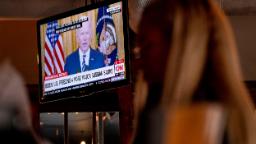
(CNN)For all the words and images of Russia and Ukraine that have been flooding American media in recent weeks, some analysts are wondering how well American news consumers are being served by the coverage. Are they learning anything about Ukraine? If not, what context is missing?
This is especially true when it comes to the recent history of the two nations and the point of view of Ukrainian citizens—highly important matters in overall framing of coverage and how audiences come to think of events that could lead to thousands of deaths in coming days now that the attack is underway.
One of journalism’s most inexcusable failures has been in not showing audiences the crisis through Ukrainian eyes.
A headline on an article by Mychailo Wynnyckyj on the Atlantic Council’s website put it best: “Stop asking what Putin wants and start asking what Ukrainians want.”
“As I watch the never-ending coverage of the current Russian military build-up around Ukraine, I am struck by the fact that, as presented by the international media, the situation seems to have little to do with Ukrainians,” Wynnyckyj, an associate professor at the Kyiv-Mohyla Academy, wrote last month. “Ukraine is clearly at the heart of the story, but there is almost no discussion whatsoever about what the Ukrainians themselves actually want.”
Instead, it is Russian President Vladimir Putin who has certainly received widespread coverage, too often without correction of his lies, particularly on right wing media in the U.S.
Hard as it might seem to believe Fox News host Tucker Carlson could find any new lines of decency to cross, he did just that this week in suggesting Americans should be more sympathetic to Putin and less so to the Ukrainians.
But analysts like Philip Seib, author of the book “Information at War: Journalism, Disinformation and Modern Warfare,” have been raising concerns about more basic and subtle aspects of coverage like language and facts.
Talking about early coverage before Thursday’s ferocious invasion, Seib said it “bothered” him that “there was all this talk saying “if Russia invades.”
“Listen, Russia invaded Ukraine in 2014, and 14,000 Ukrainians have died since in fighting. So, a little bit broader context including what happened in 2014 is needed,” Seib said.
“This is not some sudden thing that has come up and it’s not unprecedented. Given Putin’s history over the past eight years with Ukraine, I have been bothered to see the story reported as if it was a new thing that was happening and we didn’t really know how to deal with it and so on so forth. It’s been going on eight years, and I think that needs to be prominently included in the coverage.”
Seib, a professor emeritus of journalism and public policy at the University of Southern California, learned this lesson when delivered a lecture in Lviv in 2019 and referred to the “conflict” between Russia and Ukraine.
“Afterwards, I got a properly nasty note from a senior member of the Ukraine Parliament saying, ‘This is not a conflict. It’s a war.’ And she was right.”
The Washington Post among others was referring to the situation pre-invasion on Wednesday as a conflict in this headline: “Tucker Carlson, downplaying Russia-Ukraine conflict, urges Americans to ask, ‘Why do I hate Putin?’
And based on a cursory sweep of homepages at the time of writing, some news sites are still using the word in headlines even though Russia has already launched missiles into Ukraine.
In the wake of Russia’s all-out invasion, however, the Ukrainian point of view received dramatically more coverage Thursday in the wake of Russia’s all-out invasion, particularly on CNN with its team of reporters on the ground.
CNN’s Clarissa Ward interviewed a mother and her two children who were sheltering from explosions with hundreds of others in a subway station in Kharkiv.
The woman told Ward they fled their home at 5 a.m. as explosions woke them. She expected they would be staying in the station overnight with only water and a small bag of snacks.
“We try to be brave because we have children and we don’t want to show them that we are scared,” she said.
As she spoke, you couldn’t help but feel the fear in that underground shelter and start to understand what it was like to be a Ukrainian parent on the wrong end of Putin’s brutal and unprovoked aggression.
Add Comment